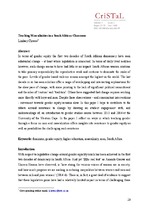Teaching Masculinities in a South African Classroom
Abstract
In terms of gender equity the first two decades of South African democracy have seen
substantial change - at least where legislation is concerned. In terms of daily lived realities
however, such change seems to have had little or no impact. South African women continue
to take primary responsibility for reproductive work and continue to dominate the ranks of
the poor. Levels of gender based violence remain amongst the highest in the world. The last
decade or so has seen scholars offer a range of overlapping and intersecting explanations for
the slow pace of change, with some pointing to the lack of significant political commitment
and the roles of 'custom' and 'tradition'. Others have suggested that change requires working
more directly with boys and men. Despite these observations - and concomitant interventions
- movement towards gender equity remains slow. In this paper I hope to contribute to the
debate around resistance to change by drawing on student engagement with, and
understandings of, an introduction to gender studies course between 2013 and 2014 at the
University of the Western Cape. In the paper I reflect on ways in which teaching gender
through a focus on men and masculinities offers insights into resistance to gender equity as
well as possibilities for challenging such resistance.

